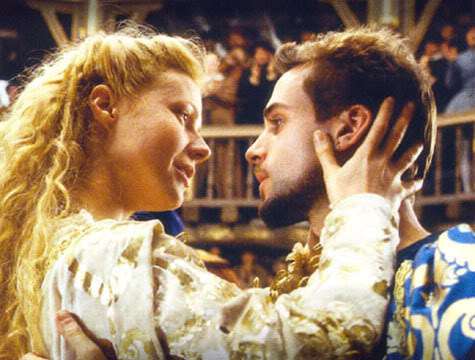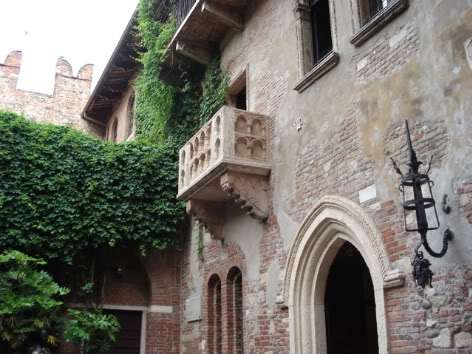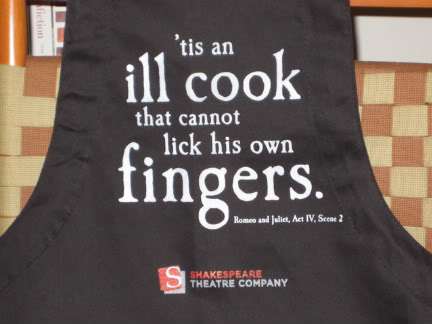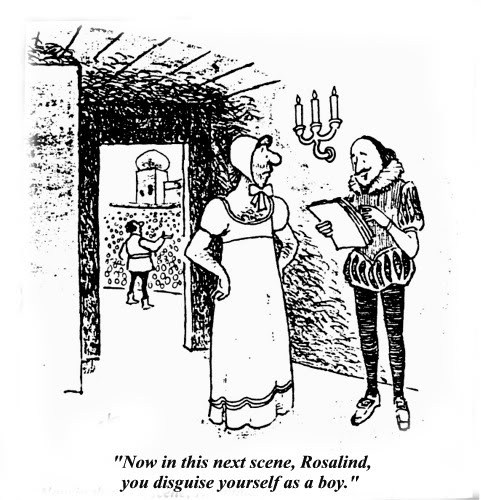“Stage love will never be true love while the law of the land has our heroines played by pipsqueak boys in petticoats.” ~ Viola from Shakespeare in Love

Well, it’s finally happened.
I always thought I was reasonably enlightened when it came to Shakespeare. I studied his plays in high school and college, and once upon a time, I traveled to Stratford-on-Avon to see where he was born. I saw the Royal Shakespeare Company perform Hamlet in England, and even ventured to Verona to gaze at Juliet’s balcony.

But I guess nothing could have prepared me for Shakespeare in drag.
When I heard that the Shakespeare Theatre Company in Washington, D.C., was performing Romeo and Juliet with an all-male cast, I jumped at the chance. I would finally get to see the play as Shakespeare intended — written for and performed by male actors, at a time when women never appeared on stage.
To prepare, I re-read my favorite scenes. Juliet’s soliloquy (Act II, scene ii), spoken when she anticipates consummating her marriage, before she learns Romeo killed Tybalt, contains some of the Bard’s most ardent poetry:
Gallop apace, you fiery-footed steeds,
Towards Phoebus’ lodging! Such a wagoner
As Phaeton would whip you to the west
And bring in cloudy night immediately.
Spread thy close curtain, love-performing night,
That runaway eyes may wink, and Romeo
Leap to these arms untalked of and unseen.
Lovers can see to do their amorous rites,
And by their own beauties; or, if love be blind,
It best agrees with night. Come, civil night,
Thou sober-suited matron all in black,
And learn me how to lose a winning match,
Played for a pair of stainless maidenhoods.
Hood my unmanned blood, bating in my cheeks,
With thy black mantle till strange love grow bold,
Think true love acted simple modesty.
Come, night; come, Romeo; come, thou day in
night;
For thou wilt lie upon the wings of night
Whiter than new snow upon a raven’s back.
Come, gentle night; come, loving, black-browed
night;
Give me my Romeo; and, when I shall die,
Take him and cut him out in little stars,
And he will make the face of heaven so fine
That all the world will be in love with night
And pay no worship to the garish sun.
O, I have bought the mansion of a love,
But not possessed by it; and though I am sold,
Not yet enjoyed. So tedious is this day
As is the night before some festival
to an impatient child that hath new robes
And may not wear them.
Associate Artistic Director, David Muse, said of R&J:
. . . when both of these roles are played by men, a lot of the performance of their love needs to live in the language that they speak. And Shakespeare was a writer of gorgeous poetry, but the reason the love poetry in this play is so glorious is in part because Shakespeare knew that two young men would be performing it. You couldn’t just count on two actors looking at each other and realistically being in love in a way that the audience was going to buy. And so the actors need to jump into the language and make its power convince us of the power of this love.
I tried very hard to keep an open mind, discounting the overly romanticized Hollywood versions that are part of my DNA. And to be fair, the actors who played Lady Capulet, Lady Montague, and Juliet’s nurse gave seamless performances. They embodied their characters fully and gender was of no consequence.
But Juliet (see him here), was taller than Romeo, gangly, and came off somewhat campy (loose wrists were involved). I was unable to suspend disbelief and agreed with Viola: natural femininity — all the nuances of facial expression, gesture, and comportment, crucial in communicating Juliet’s feelings of true love, were absent in this particular performance. Bravo, I say, bravo, for female actors! Henceforth, leave the gonads where they belong.
A couple of things made up for my disappointment, though.
I got this cool apron,

and two 10-year-old boys, sitting in front of us, offered a resounding “YES!” when asked if they enjoyed the play. Don’t you just love it when kids like Shakespeare?
The Poetry Friday Roundup is at Anastasia Suen’s Picture Book of the Day. Make haste!


Great post! I loved reading the beautiful words of Shakespeare to start my day. And while Juliet was quite “pretty” for a guy, if he couldn’t pull off the performance convincingly, all is lost. Thanks for sharing!
LikeLike
Sara has all-male Shakespeare today, too (Shakespeare Behind Bars) that looks worth the look. Love your new apron!
LikeLike
I think I would have trouble with the male playing females myself.
LikeLike
Love the apron and the cartoon. 😀 I’ve never seen an all-male cast – definitely would be interesting. Shakespeare in Love is one of my favorite movies, though, so it was very nice to start my day with an image and quote from that.
LikeLike
Keep in mind that I’m looking at a pictureless version of your post, because of computer problems.
So, I read only the poetry and got to enjoy Shakespeare’s real treat, great poetry.
And I have to say that if the performance isn’t convincing, the words are all that matters. So I agree with Viola. 🙂 Besides, actresses deserve a chance to play the great Shakespearean roles.
LikeLike
We had a director for a few years at our nearby Shakespeare festival who repeatedly put men in drag, reversed gender. The first time, I thought it worked at least okay, the sixth time I was pretty done. And then he staged The Doll House as though it were I Love Lucy. People were laughing out loud at the husband’s lines. So, so wrong.
LikeLike
It was a huge risk for the director and the actor who played Juliet, so I commend them for their courage and desire to produce something “authentic.” Perhaps another actor may have pulled it off — who knows? All I can say is thank God Charles II decided to allow women on stage after he reclaimed the throne!
LikeLike
Yes, I’m definitely going to check out Sara’s post. I guess the Shakespeare vibes were strong in Virginia today!
LikeLike
So much depends on the actor. I wasn’t as conscious of the other female roles as I was with Juliet — and when one of the main characters doesn’t work, it’s difficult to enter the world of the play as a whole.
LikeLike
I feel the same about Shakespeare in Love. The apron gives me permission to lick my fingers at every turn :)!
LikeLike
Hello, Joe Fiennes! LOVE your userpic. Sorry to hear you still can’t see my pictures!! David Muse said in an interview that he was prompted to do an all-male play because of a recent trend to produce Shakespeare that way. Glad you enjoyed the excerpt anyway.
LikeLike
That sounds painful. Ibsen probably turned in his grave.
LikeLike
TadMack says: 🙂
Oooh, what a good, good, GOOD reminder that the original was ALL DONE BY MEN! And isn’t Juliet gorgeous — even with his large hands and broad throat? I’m sorry he couldn’t pull it off.
IF I’m very nice, will you let me wear that apron???
You know, R&J isn’t my favorite of the great plays by far, but that really is a lovely speech.
LikeLike
Shakespeare in Love is one of my all time favorites— =)
LikeLike
Re: TadMack says: 🙂
I agree that James Davis is purty to look at! He had a certain charm about him, and was a very exuberant 14-year-old. I’m thinking part of my problem was that I couldn’t get Olivia Hussey and Gwyneth Paltrow out of my mind. They were so beautiful, and so feminine.
You can borrow the apron anytime, as long as you send me the goodies you bake while wearing it.
LikeLike
YES!! Love your taste in movies, Heidi :).
LikeLike
thank ya! =)
LikeLike
Yes, those vibes are strong!
I adore Shakespeare in Love and all the gender bending that goes on in it. But we are IN on that secret, aren’t we? For this all-male R&J, it’s like there’s an open secret, but we aren’t supposed to notice it at all. Or are we supposed to notice it and then reflect on love and gender? I don’t know—so many of Shakespeare’s characters twist our ideas of role playing around. But I don’t think of R&J as primarily being about that. Maybe that’s why it doesn’t work for a modern audience?
Anyway, I’m so glad you went and reported for us!
LikeLike
I wanted to see an all-male production in Philly, but missed it. I don’t believe there was any drag involved, however: it was a modern take involving a boys’ boarding-school production, and I think had only 4 actors playing all roles.
When I was touring the Rosenbach Museum & Library, I got to see a signed charter from King Charles I, declaring that henceforth all female parts in the theatre were to be played by females.
LikeLike
No! Not loose wrists!
Love the cartoon. And the poetry, of course. Makes me want to do some proclamation myself. Now if I can only find a balcony…
LikeLike
Oh, what a full post, Jama. First off, I loved Shakespeare in Love and, BTW, I once took a yoga class with G. Paltrow and she is THAT beautiful… Plus, I love that soliloquoy with all its nightness… and oh, that performance sounds not quite right. I’m all for pushing boundaries and asking us to reexamine but we gotta fall for it in our hearts, don’t you think???
LikeLike
Someday I hope to be able to use the word ‘gonads’ in a post with as much authority as you have here!
LikeLike
You’re right — when we’re not supposed to notice something, we notice it even more. D.Muse did say that to him the play examined what it means to be a male. All the strife was caused by male bravado, and right smack dab in the middle of this is R&J, Romeo being atypical, and overly romantic. Hmmm, lots to chew on.
LikeLike
Swoon!! Amazing the document survived!! You MUST visit the British Museum Manuscript Room someday — it’s full of original writings by so many literary luminaries.
LikeLike
Re: No! Not loose wrists!
Hope you’re not afraid of heights ;)!
LikeLike
You hit the nail on the head — fall for it in our hearts. Yes, I was so hoping to do just that!!
And you saw GP in person?! Swoon. I love her work . . .
LikeLike
And you shall, ML. After all, “civilized” persons such as yourself will opt for it in lieu of balls :)!
LikeLike
Re: No! Not loose wrists!
Actually, I am a little afraid of heights. But the person who’ll be even more afraid is my husband if I start proclaiming on balconies!
LikeLike
Aha! Finally the story about what you didn’t like about that production.
Love the apron!
I once saw that movie adaptation of “Romeo and Juliet” with Leonard Dicaprio (is that right?), and as the credits rolled, the teens behind me stood up and said, “that would have been better if it were spoken in English.”
Jules
7-Imp
LikeLike
I only saw parts of that adaptation with Leo and Claire Danes. Interesting comment from the teens behind you!
LikeLike